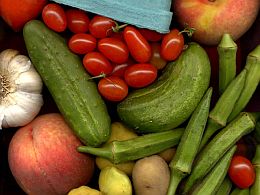Are Organic Foods Better for Healthy Eating?
Avid fans of organic foods are everywhere these days. According to the Organic Trade Association, the U.S organic food market has sloped upward from $3.5 billion in 1996 to $28.6 billion in 2010. Organic food enthusiasts are growing in numbers as more and more people are becoming educated on healthy eating habits. But is it worth the craze? Are organic foods better for healthy eating?
 Organic foods are foods that are not cultivated using modern, industrial farming methods such as the use of pesticides, synthetic fertilizers, sewage sludge, genetically modified organisms, irradiation, or food additives.¹ Organic foods are grown by using industrial-free methods and without genetic engineering. They are also grown by depending on nature’s own methods of grooming and pest control. The U.S. Department of Agriculture (USDA) is heavily involved with inspections and certifications at sites where organic foods are grown, and there is usually a voluntary USDA green-and-white seal on packaged organic foods to help consumers identify these foods.
Organic foods are foods that are not cultivated using modern, industrial farming methods such as the use of pesticides, synthetic fertilizers, sewage sludge, genetically modified organisms, irradiation, or food additives.¹ Organic foods are grown by using industrial-free methods and without genetic engineering. They are also grown by depending on nature’s own methods of grooming and pest control. The U.S. Department of Agriculture (USDA) is heavily involved with inspections and certifications at sites where organic foods are grown, and there is usually a voluntary USDA green-and-white seal on packaged organic foods to help consumers identify these foods.
Are Organic Foods Better?
In the United Kingdom, a 12-month systematic study of the nutrients present in organic foods, collected from 50 years’ worth of research data (January 1978 to February 2008), has verified that organic foods are not nutritionally better (or more nutritionally deficit) than conventional or industrial foods.² The study was authorized by the Food Standards Agency (FSA) and investigated by researchers at the London School of Hygiene and Tropical Medicine.
Small differences in nutrients contained in both organic and conventional foods were observed:
- Higher content of nitrogen in conventional foods.
- Higher content of phosphorous and titratable acidity in organic foods.
These were very small differences and were mostly as a result of differences in production methods (fertilizer use and ripeness during harvest).
Health Benefits of Organic Foods
Although scientific evidence has not proven that eating only organic foods as opposed to industrially-processed foods is better for our health, this does not eliminate the possibility that it will be validated in the next few years. And when it comes to our health, it is better to always err on the safe side. Although they are not scientifically recognized to be better than industrial foods, there are actually some great health benefits to eating organic foods:
- Organic Foods do not contain Pesticides: Pesticides are not just dangerous to the environment (for example by seeping into natural water sources), they also have potential long-term risks to those who consume foods containing residues of pesticides. There is concern over long-term exposure to pesticides (especially organophosphates) leading to both acute and chronic health conditions, for instance cancers such as Non-Hodgkin Lymphoma and Leukemia. Food producers try to decontaminate foods suspected of containing pesticide residues by using ionizing radiation.
- Organic foods have lower nitrate content: Higher level of nitrate is associated with medical conditions such as gastrointestinal cancer, and in infants, methemoglobinemia.³
- Organic food production has better environmental impact: There are no harmful pesticide run-offs, it encourages the sustenance of diverse ecosystems (due to crop rotation), and yields higher quality soil and lower nutrient losses in the soil from leaching.
References:
1. Allen G. J, Ababa, K. The Business of Food: Encyclopedia of the Food and Drink Industries. Westport, CT: Greenwood Press; c2007. P. 288.
2. Dangour A.D, et al. Nutritional Quality of Organic Foods: A Systematic Review. The American Journal of Clinical Nutrition [Internet]. 2009 Sept 1. 90:680-5. Available from: http://ajcn.nutrition.org/content/early/2009/07/29/ajcn.2009.28041.full.pdf+html
3. Foreman J, MD, Silverstein J, MD. Organic Foods: Health and Environmental Advantages and Disadvantages. PEDIATRICS [Internet]. 2012 Oct 22. 130(5):e1406-e1415. Available from: http://pediatrics.aappublications.org/content/130/5/e1406.full.pdf+html
-
Advertisement

 Facebook
Facebook  Twitter
Twitter  RSS
RSS







